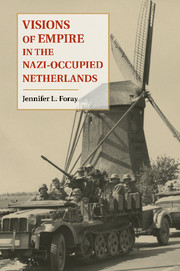Book contents
- Frontmatter
- Contents
- Acknowledgments
- Abbreviations
- Introduction
- 1 War Comes to the Kingdom
- 2 The Landscape of Resistance and the Clandestine Press
- 3 “Look to the East!”
- 4 “Indies Lost, Disaster Born”
- 5 Mutuality, Equality, and the Commonwealth
- 6 Countering the Commonwealth
- 7 “After Our Liberation, That of Indonesia”
- 8 Wartime Consensus and Postwar Pressures
- Conclusion
- Bibliography
- Index
- References
1 - War Comes to the Kingdom
Published online by Cambridge University Press: 05 December 2011
- Frontmatter
- Contents
- Acknowledgments
- Abbreviations
- Introduction
- 1 War Comes to the Kingdom
- 2 The Landscape of Resistance and the Clandestine Press
- 3 “Look to the East!”
- 4 “Indies Lost, Disaster Born”
- 5 Mutuality, Equality, and the Commonwealth
- 6 Countering the Commonwealth
- 7 “After Our Liberation, That of Indonesia”
- 8 Wartime Consensus and Postwar Pressures
- Conclusion
- Bibliography
- Index
- References
Summary
The German occupation of the Netherlands formally began on May 15, 1940, and would last for nearly five years. During the first year of this occupation, the Dutch struggled to make sense of the new situation in which they suddenly found themselves. In just a matter of days, the Netherlands had lost its neutrality, its sovereignty, and much of the port city of Rotterdam, which had been destroyed by the Luftwaffe in an attempt to force the Dutch to surrender. The queen, the royal family, and the Dutch cabinet had fled the country for London. From their adopted home in England, Queen Wilhelmina and her ministers assumed control of the Dutch empire, or, more precisely, the overseas territories of this historic empire. The European motherland had been occupied, so reasoned this new government-in-exile, but as long as the East and West Indies remained free, the Kingdom of the Netherlands continued to exist. In German eyes, however, this kingdom had come to an end on May 14 when the Dutch commander in chief, General H. G. Winkelman, capitulated to the invading forces. Hitler now put into effect his plans – formulated the previous October – for a military administration of the Low Countries and France; on May 15, he announced that Wehrmacht General Alexander von Falkenhausen would serve as military commander for both Belgium and the Netherlands. Falkenhausen’s reign proved exceptionally short-lived, however, as a mere few days later, Hitler changed course. Instead of a military administration, the Netherlands would see a civilian administration under the authority of Dr. Arthur Seyss-Inquart, an Austrian lawyer who had played a prominent role in the Anschluss of 1938 before serving in occupied Poland.
Under Seyss-Inquart, the constitution of the Kingdom of the Netherlands remained in effect but was rendered superfluous by Hitler’s appointment decree of May 18, which granted the Reichskommissar authority to issue decrees carrying the force of law. In administering the occupied country, Seyss-Inquart could look to his four Generalkommissare, or commissioners general, who were charged with overseeing the newly created departments of Administration and Justice, Finance and Economy, Special Affairs (alternatively titled Political Affairs and Propaganda), and Security/Police Concerns. These commissioners general assumed authority over the Dutch governmental agencies already in existence, merging them and creating new organizations if and where German interests would be best served. Of these four men, Hanns Albin Rauter would become most familiar to the Dutch: As both Generalkommisar für Sicherheitswesen (Commissioner General for Security) and Höher SS und Polizeiführer (Leader of the SS and Police Forces, or simply HSSpF), Rauter directed all security and police organizations, both German and Dutch, in the occupied country. Hitler also appointed a military counterpart, Air Force General Friedrich Christian Christiansen, to Seyss-Inquart’s civilian-led administration. Wehrmachtsbefehlshaber in den Niederlanden (Commander of the Armed Forces in the Netherlands) Christiansen was to concern himself with overtly military matters, such as the maintenance of the country’s coastal defenses. During the first few years of the occupation, the Dutch public witnessed the direct involvement of German troops only in exceptional circumstances, such as those presented by the February Strike of 1941, and even then, the SS police organizations, not the Wehrmacht, were employed first. As the war continued, however, and as material conditions steadily deteriorated, these German military forces assumed an increasingly prominent position in the occupied Netherlands.
- Type
- Chapter
- Information
- Visions of Empire in the Nazi-Occupied Netherlands , pp. 20 - 55Publisher: Cambridge University PressPrint publication year: 2011



